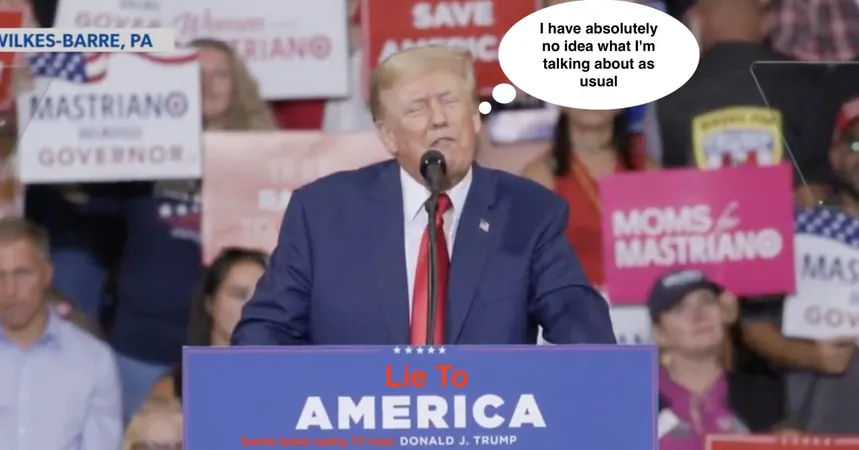
Trump’s Transition Team Plans to Reshape the Future of Electric Vehicles - Is This the End for EVs in the US?
2024-12-16
Author: Liam
Trump’s Transition Team Plans to Reshape the Future of Electric Vehicles - Is This the End for EVs in the US?
In a move that has sent shockwaves through the automotive industry, the Trump transition team has unveiled a bold plan aimed at dramatically reducing support for electric vehicles (EVs) in the United States. This initiative, if implemented, could effectively stall the growth of an already sluggish EV market, which currently accounts for only 9% of new car sales—less than half the rate seen in China and many European countries.
During his campaign, Trump pledged to curb the rise of electric vehicles by eliminating the $7,500 federal tax incentive designed to encourage their adoption. The proposed cuts are not limited to just tax credits; the transition team is also focused on slashing funding for electric vehicle production and the establishment of charging stations—essential infrastructure for supporting EV growth.
Documents obtained by Reuters reveal that the incoming administration's strategy includes repositioning federal funds designated for EV initiatives towards securing domestic battery materials, highlighting a shift in priorities. The documents characterize battery materials as a “national-defense issue,” stepping away from the Biden administration's approach, which emphasized bolstering a domestic battery supply chain while simultaneously promoting a swift transition to electric vehicles.
This reshaping of policy is likely to impose significant drawbacks on the EV market. With a significant portion of the $7.5 billion allocated for charging stations already distributed, redirecting these funds may pose considerable challenges. Analysts predict that these changes could stifle growth in EV sales, pushing the U.S. further behind in the global race for electric mobility.
Moreover, the Trump transition team is looking to impose tariffs on parts and battery materials from all countries, intending to negotiate exemptions with allied nations. This could further complicate the supply chain and inflate production costs, making it even harder for American consumers to afford electric vehicles.
The abrupt policy shift could spell disaster for the American EV market, as experts warn that a strong domestic EV sector is essential for advancing local battery material projects. This situation raises the question: How will this impact future investments in green technologies and the U.S.'s ability to compete in the global EV market?
While some may argue that eliminating EV incentives could help accurately reflect the true costs of fossil fuels, the reality is that such a move could drive consumers back toward gas-powered vehicles. The vice president-elect has even floated the idea of introducing incentives for traditional vehicles, which could further undermine the push for sustainable transportation.
As the world moves steadily towards greener technologies, the question remains—can the U.S. afford to dismiss electric vehicles? Or will Trump’s plans ignite a comeback for fossil fuels, pushing the nation further from the clean energy goals it desperately needs to achieve? The future of transportation in America hangs in the balance, and all eyes are on the unfolding policies of the incoming administration.









 Brasil (PT)
Brasil (PT)
 Canada (EN)
Canada (EN)
 Chile (ES)
Chile (ES)
 España (ES)
España (ES)
 France (FR)
France (FR)
 Hong Kong (EN)
Hong Kong (EN)
 Italia (IT)
Italia (IT)
 日本 (JA)
日本 (JA)
 Magyarország (HU)
Magyarország (HU)
 Norge (NO)
Norge (NO)
 Polska (PL)
Polska (PL)
 Schweiz (DE)
Schweiz (DE)
 Singapore (EN)
Singapore (EN)
 Sverige (SV)
Sverige (SV)
 Suomi (FI)
Suomi (FI)
 Türkiye (TR)
Türkiye (TR)